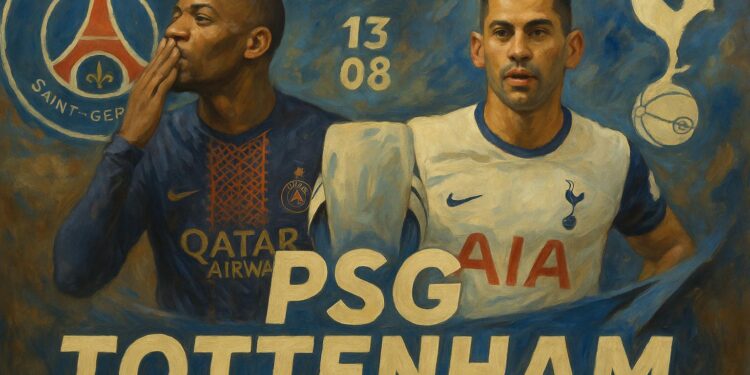Udine’s Floodlights and Europe’s Grand Narrative
When the Stadio Friuli illuminates on 13 August, more is at stake than the UEFA Super Cup’s silverware. The evening will offer a tableau of European soft power in which two privately-owned clubs backed by very different capital structures seek to project influence far beyond their domestic borders. For diplomats who increasingly read football as a barometer of economic confidence and regulatory sophistication, Paris Saint-Germain’s Qatari-financed ascendancy and Tottenham Hotspur’s North-London corporate pragmatism form a study in contrasts that mirrors broader continental debates over investment screening and fiscal sustainability.
Parisian Ambition After a Quadruple Season
Luis Enrique’s side arrives in north-eastern Italy with the aura of a modern juggernaut. A domestic quadruple, an emphatic 4-0 semi-final dismissal of Real Madrid during the Club World Cup and a transfer budget still buoyed by sovereign-wealth support have entrenched the perception of PSG as Europe’s laboratory for high-performance management. Yet the tour of the United States exposed a structural fragility at centre-back, evidenced by the 0-3 fall to Chelsea in the final. The pursuit of Bournemouth’s Ilya Zabarnyi underlines an analytical approach to squad-building that now dominates the Ligue 1 champions’ boardroom conversations. Should either Marquinhos or newcomer Willian Pacho succumb to injury, Udine could reveal whether depth has kept pace with ambition.
Tottenham and the Danish Recalibration
Across the Channel, chairman Daniel Levy responded to a first major trophy in seventeen years with characteristically surgical change. Ange Postecoglou made way for Thomas Frank, whose Brentford tenure showcased data-driven pressing and squad efficiency. Frank’s early window was bold: central-defensive reinforcements, João Palhinha’s steel in midfield, Mohammed Kudus’s creative volatility and the capture of Kevin Danso and teenager Mathys Tel. The emotional departure of long-serving captain Son Heung-min to Major League Soccer closed one chapter but allowed wage-bill headroom. Tottenham’s unbeaten pre-season suggests the learning curve has been negotiated quickly, though the transition from friendly tempo to competitive intensity often tells a harsher truth.
The Odds Market as a Mirror of Perception
Online bookmakers—led by internationally regulated brands such as 1xBet—currently price a Parisian victory at approximately 1.45, a Spurs triumph at 6.66 and a draw at 5.04. For risk analysts, those figures condense layers of statistical modelling: PSG’s 78 percent average share of possession in high-stakes matches last season, Tottenham’s 0.87 goals conceded per game post-January and the neutral venue’s modest Italian crowd that dilutes home-field bias. Yet seasoned observers note that Super Cup fixtures tilt towards unpredictability; five of the past eleven editions have required extra time or penalties. Sensible stake management and adherence to responsible-gaming guidelines therefore remain the prudent course, a point UEFA and national regulators have underscored in recent integrity briefings.
A Stage Larger than Football
If the match narrative oscillates between Dembélé’s acceleration and Kudus’s improvisation, the subtext belongs to strategic communication. For Qatar Sports Investments, another continental title would reinforce a soft-power arc already visible through renewable-energy conferences and humanitarian support programmes. For Tottenham’s ownership group, lifting the trophy would validate a self-financing model at a moment when Premier League clubs face stringent cost-control proposals. Either outcome will feed into negotiations for expanded Asian broadcast slots and North-American pre-season tours that inject essential revenue into European football’s post-pandemic recovery.
Diplomatic Takeaways
Regardless of the scoreline, Udine will present policy actors with three salient lessons. First, elite sport remains a dependable conduit for diplomatic messaging; stadium visibility often travels farther than communiqués. Second, governance debates around competitive balance are intensifying, as illustrated by continued calls for luxury-tax mechanisms within UEFA fora. Third, the maturation of licensed online betting—when coupled with robust consumer-protection frameworks—can coexist with integrity objectives, turning wagering platforms into data partners for match-fixing detection rather than antagonists.
The Final Whistle and What Lies Ahead
Super Cups are by design fleeting, yet their reverberations can inform a season’s trajectory. Should PSG prevail, attention will pivot to whether depth upgrades can sustain a domestic-continental double. Should Tottenham upset the odds, the Premier League’s competitive hierarchy may feel a tremor. For diplomats charting the interplay between sport, economics and public perception, 13 August offers a compact—even elegant—case study. The scoreboard will freeze at full time; the soft-power calculus will continue to evolve long after the floodlights dim.












































